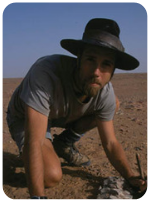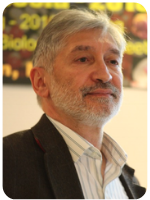Principal Members
The IQBI is a team of experts in molecular and cell/tissue imaging, physics, bio/chemistry, mass spectrometry, comparative biology, bioengineering, and bioinformatics. Our individual expertise across all scientific fields combine to create a truly detailed yet interdisciplinary approach to modern biological challenges.
|
Jackie Vogel McGill University |
The mitotic spindle plays an essential role in the transmission of genetic information during cell division in all eukaryotic cells. Our research focuses on spindle assembly and mitotic control mechanisms. We use budding yeast as a model for the detailed analysis of these evolutionarily conserved processes, using high-resolution microscopy, biochemistry, molecular genetics, and the analysis of relevant genetic networks and protein structure-function relationships using genomic and bioinformatics methods. |
|
Gary Brouhard McGill University |
Our lab investigates the biophysical basis of tubulin polymerization by measuring the kinetics and energetics of microtubule formation. Using single-molecule biophysics, biochemistry, as well as work with model organisms we study how enzymes control the shape of microtubules. This focus on the molecular basis of morphology is particularly of interest, especially in how the microtubule cytoskeleton determines the location of neurons in the brain. |
|
Rodrigo Reyes McGill University |
The aim of our work is to provide insight on the stoichiometry, architecture, dynamics and heterogeneity of various multi-component molecular machines that participate in the replication, repair and segregation of chromosomes using fluorescent microscopy single-molecule techniques in living cells. Our group develops chemical and genetic probes to report on the metabolism of cells, genetic tools for precise manipulation of cell physiology, and microscopy techniques for detection of weak fluorescent signal and image analysis. |
|
Marlene Oeffinger Institute dé recherches cliniques de Montréal (IRCM) |
The main focus of our lab is to determine the temporal and spatial assembly and coordination of RNA maturation factors, as well as to identify the underlying control mechanisms that drive the processing, modification and assembly of different RNAs. We combine proteomic, RNomic, biochemical and computational approaches to build a dynamic picture of RNA maturation pathways to yield important information on how this is linked to other cellular processes including cell division, development as well as onset of various diseases. |
|
Ehab Abouheif McGill University |
Our lab primarily focuses on the Eco-Evo-Devo field of biology which builds on the groundbreaking discovery that there is a highly conserved genetic ‘tool kit’ of regulatory genes, such as Hox genes, that control the development of all animals. These genes play a critical role in setting up segments along the anterior–posterior axis of all animals during development. These Hox genes are conserved in terms physical location, expression, and function in all animals and this is considered one of the great discoveries in biology. |
|
Allen J. Erhlicher McGill University |
One of life's amazing feats is the conversion of chemical energy into active forces in precisely controlled ways, enabling us to take a walk, or our immune cells to chase infectious bacteria. In our research we examine how biology generates forces and regulates its material properties, with a particular focus at the scale of 100 microns to nanometers. By studying molecules and cells, we try to understand the physics behind cellular processes of our body's function or failure, and also direct strategies for new kinds of composite materials inspired by biology. |
|
Hans Larsson McGill University |
The overarching theme of our research is macroevolution; whereby we investigate the evolution of ecosystem communities and the process of evolutionary transformations. Vertebrate palaeontology and developmental evolution. The palaeontological work focuses on terrestrial Mesozoic vertebrates in the Canadian arctic and explores signatures of ancient climate shifts in palaeo-faunas. Developmental evolution work addresses what developmental mechanisms are responsible for changes in the evolution of vertebrate morphology. |
|
Paul Lasko McGill University |
Using Drosophila models we investigate proteins and histones to study fundamental genetic regulatory mechanisms that operate at the RNA level (including translational control) and that underlie developmental events. Vasa is an RNA binding protein linked to translational control and piRNA processes that is involved in germ cell and stem cell biology in many organisms. In addition H3.3 is identical in people and flies, and expressing the cancer-linked mutant forms of H3.3 in flies produces deleterious phenotypes. This enables us to conduct modifier screens and also to assess changes in gene expression caused by the mutant H3.3. |
|
Stephen Michnick Université de Montreal |
We are interested in two broad questions: 1) How do cells make decisions about their fate based on their interpretation of external signals and internal queues and 2) How have macromolecular complexes evolved to regulate cell fate decisions. We use a variety of techniques to achieve our aims, including cell-based assays to study the dynamics, topological organization and of protein-protein interactions, quantitative single cell time-lapsed imaging of protein, RNA and DNA dynamics, protein analysis by mass-spectrometry, and a variety of computational and modeling approaches. |
Associate Members
|
Anthony Mittermaier McGill University |
Our lab studies the molecular basis of protein function, particularly in the context of drug design. We use Nuclear Magnetic Resonance spectroscopy to characterize protein structure and dynamics, as well as calorimetry to measure the heat flow associated with protein folding and binding. The combination of these two techniques yields descriptions of protein behaviour that are atomically precise and thermodynamically rigorous. |
|
Ioannis Ragoussis McGill University |
Our lab works on technical developments, including the Single Cell Genomics Lab of MUGQIC and Mutation Detection Technologies with focus on the genomic and transcriptomic analysis of single cells. Our group is responsible for single molecule sequencing using PacBio Sequel technology, and offers single cell expression profiling and DNA analysis including exome sequencing. Both single cell whole genome expression profiling as well as whole exome sequencing protocols are validated and available for external users. |
|
Paul François McGill University |
My research focuses on the development of approaches inspired by statistical and computational physics for the theoretical understanding of the dynamics of biological systems, and of their evolution. I work in close collaboration with experimentalists of a variety of systems, from embryonic development to early immune recognition. |
|
Alanna Watt McGill University |
Our lab focuses on the development of brain circuits in both the healthy cerebellum and in animal models of ataxias, including spinocerebellar ataxia type 6 (SCA6) and ataxia of the Charlevoix-Saguenay region (ARSACS). We address fundamental questions about brain development, such as understanding the role of spontaneous neuronal activity in the developing cerebellum. We also aim to understand the pathophysiology that underlies the onset of disease symptoms in ataxias, since this may lead to new insights into treatments or prevention for these devastating human disorders. |
|
Daniel Zenklusen Université de Montreal |
We use imaging techniques to study the mechanisms and kinetics of different processes along the gene expression pathway in yeast and higher eukaryotes. From this we can implement analysis of gene expression using single molecule approaches. In particular, we combine single molecule techniques and quantitative analysis methods with mathematical modeling to gain better understanding of the general rules governing the expression of genes in complex systems. |
|
Arnold Hayer McGill University |
Our lab's research is focused on collective movement of cells, a process with critical importance for development, repair, and disease. Collectively migrating cells are self-propelled, but they coordinate their movements through neighbor-neighbor interactions with each other. Our research aims at identifying how functional coupling between cells is achieved, through communication across adhesive cell-cell junctions so that we can answer fundamental questions about the mechanisms that influence these behaviours. |
|
Susanne Bechstedt McGill University |
In order to definitively determine the influence of Microtubule-Associated Proteins (MAPs) on microtubules, we assay single microtubules in the presence of purified MAPs under controlled biochemical conditions. Our ultimate goal is to understand what MAPs in cells are doing and how we can exploit that knowledge for the development of new drug targets. We are especially interested in MAPs that help build the mitotic spindle, because aberrations in spindle assembly often result in errors in chromosome segregation and this instability is a hallmark of human cancer. |
|
Paul Wiseman McGill University |
Biophysical technique development involving fluorescence fluctuation and correlation analysis and applications to study the molecular regulation of cell adhesion, migration and cell signalling in mammalian cells and neurons. Also applications of single molecule tracking methods and nanoparticles to study protein receptor distributions and transport and nonlinear microscopy methods for imaging extra cellular matrix within intact tissue. |
|
Rowan Barrett McGill University |
Although natural selection is a deterministic process, the predictability of evolution might be limited because the ecological sources of selection and the genetic basis of adaptation can be complex. Our research combines a variety of approaches and study systems to help understand this complexity. We generate and test hypotheses about the predictability of evolution through a combination of ecological field transplant experiments, molecular biology, genomics, and computational biology. We aim to quantify the contributions of genome-wide genetic variation to fitness, and to understand the ecological and evolutionary forces that have shaped these patterns of variation between individuals, populations, and closely related species. |
|
Stephanie Crane Weber McGill University |
Cells are crowded with macromolecules that form highly organized yet dynamic structures. While advances in fluorescence microscopy enable us to visualize this spatiotemporal heterogeneity, the mechanisms underlying intracellular organization remain largely unknown. The Weber lab uses quantitative live-cell imaging and physical modeling to understand how biological systems establish and dynamically regulate spatial order in the cell and ultimately how these processes affect the growth, size and health of the whole organism. |
|
Adam Hendricks McGill University |
Our lab is focused on understanding how motor proteins function collectively, and how interactions among motor proteins and with the complex cellular environment modulate their behavior. We employ in vitro experiments that incorporate aspects of the cellular environment, high-resolution tracking and manipulation in living cells, and mathematical modeling to understand motor protein dynamics in the cell. In particular, we aim to develop methods to extend the application of single molecule techniques such as optical trapping, FRET, and subpixel resolution tracking to examine motor function in living cells. |
|
Andrew Gonzalez McGill University |
Our lab is focused on the causes and consequences of biodiversity loss. As a corollary we hope to gain a better understanding of what it will take to slow extinction and mitigate its effects. In my lab we test and develop theory using simulation, experiments (field and lab) and large databases. Ongoing research projects focus on: adaptation to environmental change, population and community stability, biodiversity and ecosystem function, metapopulation and metacommunity dynamics in variable environments, and the impacts of economy on biodiversity loss. |




















